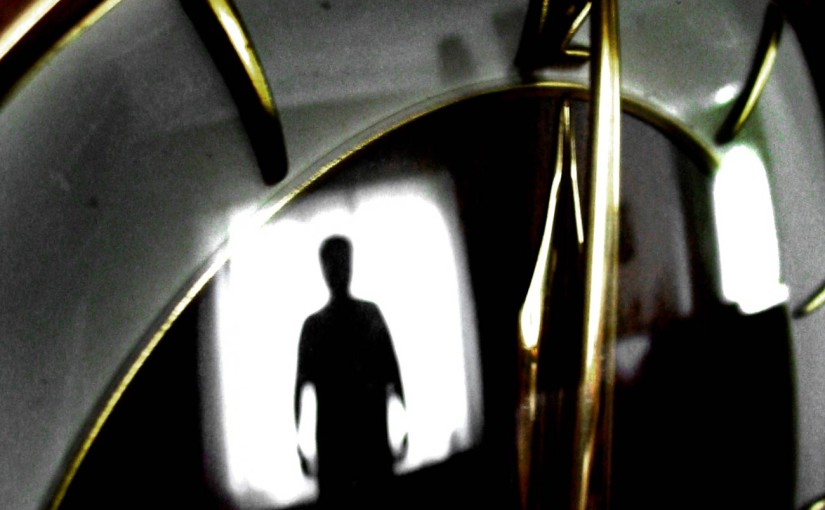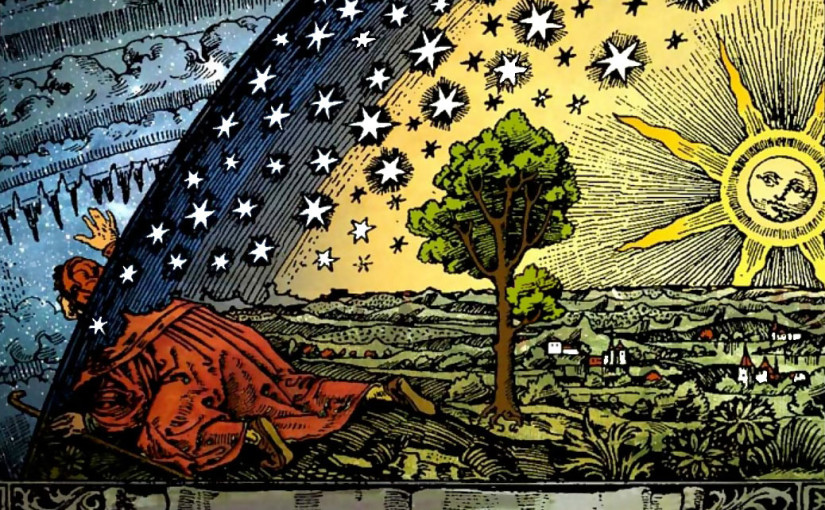Work? There is so much pleasure in work. I would not have believed it, years ago—or has it actually, already been decades? A world away from this, now. Here. It is surely personal, the theory of what may matter, and I think not that the judgments of a dream can ever be distilled into a logic without passion. Where is life without passion? There are antiseptic actions which do concoct a steady reasoning, it is true, but never would they have been initiated without some investment of the heart. To be useful to this world: this is finer than any reproductive urge, by far, in quality’s name. All is vanity, and chasing after wind… except work? That which rearranges entropy so that life is possible; that which formulates beauty in the design of the physical world, letting imagination spill into it.
And then there is love, of course. Some (many?) short circuit the question of what meaning may be by leaning with all our body weight on those overused four letters. Yes, I know what you say when you say that the meaning of life is love. Of course it is. But do you have any idea of what you’re saying when you say exactly that? In my own surveys, I have always thought that you do not need to believe in God in order to believe that God is love. And that love is so simple, we’ll never understand it. And more: love costs. Do you believe that love is measured by how much work it inspires? What is love? It is like a nothing that is an everything, like how time causes all things to happen, and is actually not doing anything of itself at all.
This is how we start. It is always thus: here, now, this—me. From there, everything that may be accomplished comes to pass. With that, and sorrow. Is it true that the house of wisdom is a house of mourning? Even if that equation exaggerates the issue, I conjecture that anything more than a surface meaning of things must dip into such dim wells, and remember their flavor. Then to say that the meaning of life is simple, dead simple: if you are alive, you already know it. Or no, you do not? You do not know it just as a fish does not know what water is. I remember back, in a dream, when the Lord asked me, “What do you want?” Whereupon I said, “I don’t know.” He said, “That means you are lost.” The worst place to get lost—in yourself.
At the other end of my soul, the fantasy won’t let me be… that of EUTOPIA. Not Utopia, which means “nowhere”, but with that initial “e”, it is “the good land”. Some people, when they believe that some task is impossible, they say, “that’s Utopia”. In a perfect world, yes? Except that things don’t have to be perfect to mean something. We deal with imperfections every day, and we make them work somehow. Destiny appears often rough hewn. It might be true that we become who we are in the dreams we forget, that the Process is a mystery—and perhaps there are reasons for that. Two shapes which are random cut fitting together with fantastic symmetry. The messianic age, which people of Jewish persuasion point out did not happen in the time of Jesus of Nazareth, actually seems to be happening now: as a thousand years is to God a single day, it were two days that the messiah had lain in the earth, to emerge with God’s will done on earth as it is in heaven: it is happening now, these two days later in that cosmic scale. The beginning is near. The beginning is here.
Would you believe me now if I say that I am a scientist? Indeed, in my brash university years I was known as a devout atheist. Much has happened from there to here, but let this pique your curiosity: if you claim yourself a skeptic, I say that you do not doubt enough. What is it if you start not to take logic for granted? When you do not hold that truth need be true, false be false? Impossible? Idiocy? Truth must always be true, and the opposite? What if there is something more primal than these? And if I tell you that God only exists to me from my point of view, and not necessarily yours, does that invite a better perspective of me?
We don’t notice that miracles happen every day simply because they happen every day. This is a clue to how the world works. Science, where we get a bundle of clues, tells you what is true, whether you believe it or not—if the things in question are within its jurisdiction. You can go overboard with that, where we enter a realm called “scientism”, in which we believe only science has any valid answers in any school of thought. Still, such a position is arguably better than fundamentalism, which claims that the universe was made in 6 24 hour days, and that somehow Adam and Eve were the parents of everyone who has ever lived. But are both extremes missing something very simple? Is it that life itself is its own meaning?
I need no reason to be because I am. Is the purpose of life… to be alive? This certainly seems to be true of the animals, and perhaps further, the plants and fungi, even the algae and bacteria. Animals seem to get by just fine, without any hint of existential crisis. Humans, on the other hand, my thinking is that even the meanest, basest of us, they will come to a point where they look in the mirror and ask, “Why am I here?” It is not enough for us just to be. In my understanding, “religions” like Buddhism actually stop at that point: they tell us that we should be content just to be. To meditate, to sit without any need for validation. Enlightenment, then, to find the state of being that perhaps the flora and fauna seem to take for granted? In my idea of things, I think, no—this solution seems less than satisfying.
The world has been described as a powerful play; it is indeed an epic current that drives into the new spacetimes at breakneck paces, if one indeed opens one’s eyes at the billion actions at every moment, in all the places where the tumblers are flipped, and we all channel that awesome river of rivers into the unknown, and so it becomes known, the fantastic reality. See, if you have eyes to see.
Understand: we do not wish to renounce this world. We do not wish to be lifted from the stresses and troubles that present themselves to our attention. We do not wish to evacuate ourselves of sweet sensations, just because we can. EUTOPIA calls us: the land of justice. We do not desire to move ourselves into the desert to be favored of some deity; we want to make something of what our forebears left for us. We want to be fruitful, and multiply. Go to your nirvana, if you have had enough of blue sky and fields of golden grain. I desire to remain attached to all the people I have met and loved. I wish to value the coins of silver I have collected. We are so close, right now, to the promise we have read about, scarce to hope. Truly, it is at this time now, here in this waking universe, that there is a path there from here. That all we need is to keep going on the direction we are generally moving towards. That all it requires of us is work. Not magic. Not miracle. Not blood. Just sweat.
What gives anything you do meaning? You get a birthday gift that is just what you wanted, and it means something to you because it is apparent that the giver put a lot of thought in it. What would make a life mean something, then? Perhaps we should modify that big question: “What is the meaning of your life?” or even, “What is the meaning of your life to you?” Is the meaning of life to achieve some goal you have set for yourself? Is the meaning of life to make some difference in the world? Would that not give meaning to your life? Significance. Purpose. And you know what? that has everything to do with love. Because in the final analysis, love is all there is. What are material things, after all, if they are just things? That perfect birthday present: there is love in it. Love = meaning. That is what we name when we say that the meaning of life is love.
But that’s not enough, do you not see? What might be the question we really ask: “What is enough?” What is enough to make life have meaning? One is tempted to think that it is a different thing to different people, that the buddhist monk who has reached enlightenment has found the meaning of life, or that family man with a good job, loving wife and 2.5 kids, 1.3 dogs, a big house in a great neighborhood, hybrid car, etc., etc., has found the ultimate answer to all those esoteric questions that those of a deeper mind have been wrestling with for millennia. If only it be enough… Because you have heard stories told, felt that desire when driving home from the store, that outside temptation not to turn left onto your street—that curious urge to just keep driving, and not look back.
Thus it is usually told that riches will not give you the meaning that you might be seeking through it, nor pleasure, nor power, nor esteem. Because what is enough? It’s never enough. Then there are the paths that are said to give you inner peace, so that whatever you do have, that will be enough. A lot of people (a lot of people) will refer to a God-shaped hole in the heart, that what is required to find all the meaning in life that you could possibly want is to find the infinite, and to house That within you. …and we’re back to “God is love.” One might be tempted to take this as perhaps a fundamentalist would (in a perfect world): that “love” is actually talking about a material substance, and that God is made up (entirely) of this one substance. A love transcendent. In addition, a corollary: since we are made in the image of God, that we are made in the image of that love, that love transcendent.
Jesus! One thing that most people overlook when talking about the Son of God, maybe because it’s thinking a little bit backward, is that if we are to believe the account of Him (that he dined with “sinners” and infuriated the rich and powerful, ultimately to end up dead while having committed no sins Himself)—if this is correct, then from the example that He is, we can therefore conclude that God (or Dad, as He called Him), is also good. The thing about the triune God is that to keep with the Judaic “God is One”, it means that the Son and the Father share the one nature that God is. To be the Son of God means that He is God, and in fact in the Gospel accounts, this is the blasphemy He is charged with, “this man says he is God” (which is punishable by death). It is well known that when there is a certain way that religious leaders act in their relation to God, this changes the nature of God for everyone within that leader’s influence. “God is love” is not in the Old Testament. Basically, He needed to show everyone Himself what Dad really was like. The picture, before Jesus, had been an incomplete one.
Understood there are millions of people who believe in God who don’t believe Jesus was His Son, and perhaps even more who don’t think there is a God at all, but when you bring up the topic of the meaning of life, you cannot ignore them. It is also understood and there is some agreement with philosophers (a- and theist) that there is ultimately no meaning without that there is a God. For instance, if in the far, far future, the universe experiences the death and dissolution of everything, what has it all been for? Even not considering that, there is something to be said about the thought that we are part of something larger.
God is love. These are arguably the most profound words ever writ. There is no ineffable: God is love. Better than anything Jesus is supposed to have said; and I speak no heresy here, for He said there would be greater deeds done by those who followed after Him. There you go. Even if you do not believe there is anything like a deity anywhere, you understand the sentiment. You understand the dream that is being had. It is the best possible thing in all the worlds anywhere, and here. Because you know, if it’s somehow true: if God really is love, then there is a reason for everything, however horrible things may be or become, or have been: nothing is in vain. And is that it, what some of us really want when we ask for the meaning of life? Just a steady voice to tell us that everything is going to be alright…
And just like trying to put all one’s eggs in love’s basket, we mayhap should not press upon the idea of God to solve everything for us. Even believing in Him, He gave us all our own conception, of our own selves and of the world. He gave us the capability to be autonomous. The parent’s duty is to make the child independent! Remember this simple thing: that if you have known love, you have known God. Believe it or not.
So, in one sentence, state the purpose of all humanity. You have 5 minutes. Go. OK, one hint: it is love, but you can’t use that in your answer. Because reasons. And you know, if you’re full of God and/or Jesus, you don’t even ask. (The reasons are because this is an unfair question.) The answer must be immediately recognizable as correct, and will last as the definitive of all answers for everything for all days, up to and including the end of days… Does nothing come to mind? There’s a reason for that! Like we all are made in the image of God, all answers are a shadow of the ultimate of answers. From the One Answer one may solve all the questions ever to be created, just like “because God” is trivially the answer to all mysteries.
The meaning of life is a secret no one knows, because it is too obvious. It is a secret that is not a secret, knowledge like the comprehension of zero. (There are zero matadors killing zero bulls, every one of them dressed in red.) What is love? In this is the secret most plain: love is work. Did you not know? Have you not heard? That fluffy, hazy, clouds-in-your-eyes sensation of being in love may be what some people think that all love is, or should be. Indeed, some scholars have denied the equivalence of “love is God” for just such a reason. But that love—love transcendent, the One Love—it is both in the natures of all the basest ideas of love, and higher than time. There is nothing greater.
The meaning of life is the proof that there is magic in the world. We all once knew, we all once believed, that anything was possible. Remember? That one moment when everything was right with the world, that one time when everything made sense… And it didn’t last, a transient strawberry that tasted so fine when you were on the ledge of a cliff, with a tiger above you and a tiger below… But o, its taste was sweet! You could not handle the meaning of life if it revealed itself to you in the everymoment; there was a soul who saw the infinite light which was the barest trim of His glory, and he knew what it meant that one could not see God and live. The meaning of life will never make sense if you seek after it, and surely will not unveil itself if you do not look for it. You know what it is. Remember?
Was there a promise you made to yourself, when you were so little, that you would never forget what it was like, just then, that you would always understand, like how you imagined all the grown ups never knew. That was how it seemed. And now, caught up in the world, did you forget? The rationales that came in the growing up, that you could never have imagined when you were that little, the responsibilities heaped upon you that could not have been thought of back when—excuses, excuses! You are still that little. Will you make that promise again? Because the meaning of life is to realize that: that you are a small child in the face of the unfathomable deep of the cosmos. This is where you fear God, for that is the beginning of wisdom. For you do not comprehend the Infinite, and you never shall; the Know is deeper than that unfathomable deep. Or how you might imagine is the depth of nonexistence. Love is deeper.
Did you hear? Love is deeper. Let death die. The meaning of life: love is sweet poetry. And true love? Does your love last forever? That is true love’s only qualification! The meaning of life: love is an electric dream. When love lit our senses (I remember you)… We have never been here before, exactly where we are now—any second time, it is not the same river, and it is not the same you. The meaning of life: whatever the cost, love is free. When we complete the circuit, everyone in the world loves everyone else, and we become not just a collective mind, but a collective spirit, a collective soul, a collective heart: this is EUTOPIA, which is landing as we speak. This is when the world loves us back (as you sow, you know?). And the meaning of life? The meaning of life is all that we forgot that did not forget us. And that, my friends, turns out to be Infinite.
When in the dream, we reach for something we know is there, in the ether—a missing part of us, perhaps, some treasure from our childhood, maybe, priceless but ephemeral—and we wake and forget what seemed so crucial, to our very existential significance and essential quality of our being—gone. Perhaps death is not sleep, after all, but when we awake to discover that what we had held so dear in that dream which is life… is not so very much of anything, after all. Even love. We love perhaps as fools love, love that is folly. Have all of us known what it is to love beyond our means? Yet love, even in folly, has its place in the Physics.
There is so much pleasure in work. Whatever you do, if it makes the world go in the smallest part, do you understand the word, “worthy”? Of worth. It means something. What makes life mean something? In general, right? Well, what is love? Is it not the one billion faces of possible kindnesses acted upon? Surely there are more, in fact. We do not have to gather all such things in a heap to comprehend what is there. Most of us, for the greater parts of our lives do not think anything of getting up and out of bed in the morning. The meaning of life is there, just there. And you know what makes some people rise and shine? That sense of purpose. Of work to do. What is the meaning of life? Get to work. Do something. At that point, and only then, are you worthy enough to ask if there is something more. What is the meaning of life? That which is the meaning in life. Nothing more, nor less. Sometimes it is small, sometimes it is great. Don’t count out the little things. For most of us, what saves us are the small things. And you wanted maybe some universe shaking Reason to Be? Be careful what you ask for; that’s a lot of work you’d be signing onto.
What about love? You are not worthy. God is love. And one thing we true believers understand is that in the proper definition of God is One who is unspeakably good. In fact, many of the misconceptions of Him are indeed because of that aspect of Him. He makes the sun shine on both the virtuous and the vile. Why hasn’t He done anything about the problem of evil? Why haven’t you? He has a plan, and it’s called Judgment Day. You don’t get to judge without that kind of knowledge. Love is always right above you, possessed in that heart where Heaven touches down into this sphere of dirt. What is it that is expressed in a better and truer way in the poor and humble rather than the rich and spoiled? We forget—nay, we never have known—that which is infinite in its goodness, and infinitely as gentle. It seems so rare when it is upon you, like no one has ever loved before you like you love now. You are right. And yet, it is in the reach of anyone who decides to open themselves to what is possible.
Do you not yet see? Yes, the meaning of life is love, but you do not understand what life is, and you understand even less what love is. Even when you are so sure you have it, have it all… You would yet be hard pressed to see the reason why some things in the world happen as they do. After the Holocaust, there were Jews who decided: it is too much, I can no longer believe. No one could blame them! And what do we say to them? What is the meaning of life? Where was the love in that horror? And yet, if you believe that there truly is a meaning of life, like we have always understood what that might mean, if there is a God—He will make good on that pain, even that pain.
What is the meaning of life? God is love. You do not need to believe in God (or even love!) to believe this. Just like you wanted the meaning of life to be. Get to work, and enter into this world a citizen of EUTOPIA. This is what you were meant to do. Do everything out of love. Believe. And if you do not believe, hope. There is always hope—when you believe this, it will be true!
To love is to be found. No one is too lost. Dream a dream bigger than what you are. Love, no matter what. At least try. Light is not an illusion. Darkness does not exist. And the game of life can be won when you decide never to be defeated.






